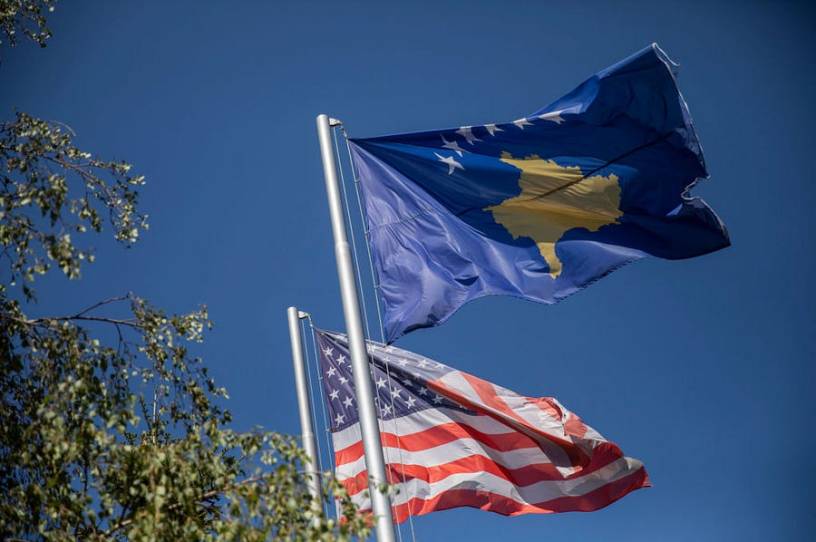The Little Country That Could Be a Big Help Fighting Terror and Extremism

The Biden administration and NATO are meeting with Russian diplomats this week to deal with Vladimir Putin’s saber rattling on the Ukrainian border. Yet the Kremlin has other avenues of influence in Eastern Europe. In Bosnia and Herzegovina, Serbian leader Milorad Dodik is threatening to tear the country apart with a new civil war. As recently as last month Putin met with Dodik in Russia.
A new conflict in the Balkans could have as many or more geopolitical ramifications as the simmering conflict in Eastern Ukraine. But one country in the region is underestimated as a potential partner for the United States in the global struggle against extremism and terrorism. It is time Kosovo received more attention for its efforts to play an important role in such efforts. Indeed, while some see Kosovo as a security liability in the region, it should be seen as a security partner.
The country’s awkward international status has complicated things. While it is recognized as an independent country by the United States and many of the world’s democracies, other countries have not recognized it to avoid provoking Russia, which has long supported Serbia. In 1998, the United States intervened in Kosovo on humanitarian grounds, creating a de facto new country. The war ultimately led the George W. Bush administration to recognize the country a decade later. To this day, the United States maintains a battalion of soldiers there as part of a larger international force to deter potential Serbian aggression. Kosovo’s counterterrorism efforts have only occasionally captured headlines, such as in 2016 when Kosovar authorities foiled a planned attack on a soccer match between Israel and Albania.
Kosovo has, almost uniquely for a Muslim-majority country, been frank and proactive in countering both creeping Iranian influence in Balkans and confronting its own internal terrorist problem.
A comparatively large number of its citizens went abroad to fight in Syria and Iraq. Some 400 adults, including roughly 50 women, left the country for Syria and Iraq in the previous decade. Estimates suggest 55 percent of Kosovars who headed to Syria and Iraq did so after the 2014 declaration of a “caliphate” by ISIS in 2015.
Kosovo has managed to bring back 110 of its citizens from Syria, and it has brought terrorism charges against those it believed guilty of such offenses.
Kosovo has been praised for its willingness to confront the problem with a level of transparency rare in the Balkans. A 2021 report from the European Commission on Kosovo noted that the country had made progress “with regard to the rehabilitation and reintegration of foreign terrorist fighters and their families.”
Kosovo is also an important bulwark against Iran in a region that Iran views as Europe’s soft underbelly. Late last year Kosovo announced sanctions against seven people and a private business because of their links to Hezbollah, and it has designated Hezbollah as a terrorist organization. Yet that designation is not merely about showcasing Kosovo’s commitment to international norms. Iran’s influence in the region has deeper roots then one might assume.
Iran sent various forms of military aid to help Bosnia against Serbia following the break-up of the former Yugoslavia in the early 1990s as the Clinton administration looked on. As the Los Angeles Times reported, “President Clinton secretly gave a green light to covert Iranian arms shipments into Bosnia in 1994 despite a United Nations arms embargo that the United States was pledged to uphold and the administration’s own policy of isolating Tehran globally as a supporter of terrorism.” The issue even prompted an investigation from the Senate Intelligence Committee.
During the term of President Mahmoud Ahmadinejad, Iran flipped the script. Iran hasn’t recognized Kosovo’s independence and has instead sought to build strong relations with Serbia. Iran’s position has also influenced Iraqi and Lebanese governments from recognizing Kosovo’s independence.
Why is Iran so obssesed with the Balkans? In a word: drugs. The U.S. Navy recently seized a $4 million Iranian heroin shipment in the Red Sea tied to a complicated heroin smuggling network in which the Balkans play a key role. A 2020 Europol report mentioned Hezbollah’s increasingly large role in European drug smuggling. The Balkans are also unfortunately a route for illicit weapons into Europe. Iran’s role in such trafficking, often via Hezbollah, is an important source of funds for Iran given the nature of the sanctions it is under.
Kosovo’s various governments over the years have remained committed to fighting terrorism. Last year the government even dug into its reserve fund to provide 250,000 euros to the Global Coalition against ISIS. Kosovo frankly needs the help of the international community in these efforts, which are impressive for a country with limited resources that doesn’t even control its own airspace.
But it’s the international community that has long hampered Kosovo’s efforts. Kosovo has long sought to join the International Criminal Police Organization better known as INTERPOL. Yet its attempts to join have routinely been blocked by Serbia, which continues to see Kosovo as a breakaway region. Serbia of course must also be engaged and encouraged to bring its policies more closely in line with Europe.
Counterterrorism in the Balkans might seem like a low priority, but let’s not forget that arguably the most geopolitically important incident of terrorism occurred in the Balkans: the assassination of Archduke Ferdinand by the Black Hand organization, which sparked World War I.